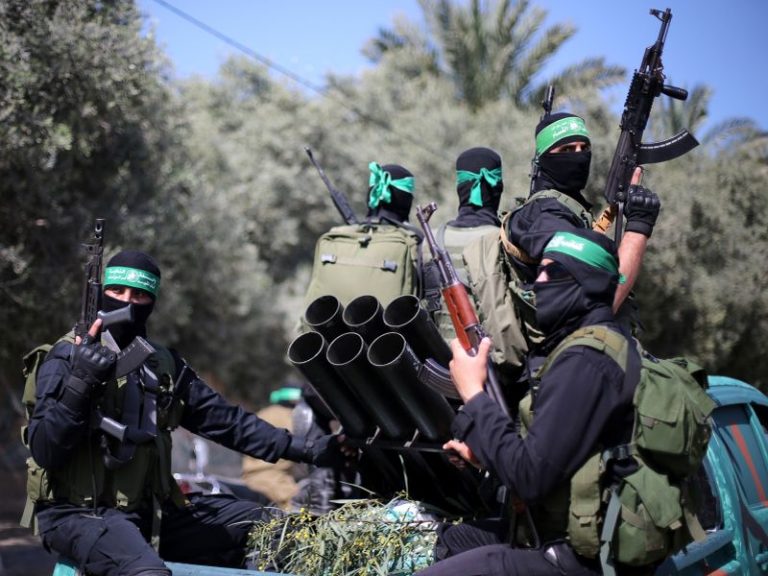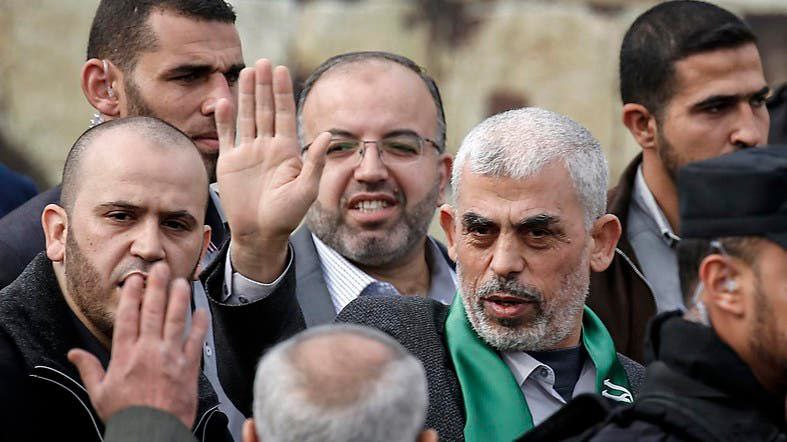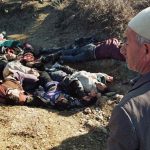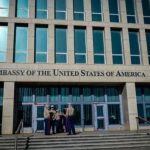Russia has launched out on carrying the ball in current Arab-Israeli escalation.
Deputy Chairman of the Hamas Political Bureau Mousa Abu Marzouk in a conversation with Russian Deputy Foreign Minister Mikhail Bogdanov claimed the movement was ready to end hostilities against Israel on a mutual basis.
Bogdanov has long been advocating to orchestrate relations between the Russians and the Hamas terrorists in Palestine.
In the 1970s, Palestinians were trained by the KGB and the GRU at special facilities, and the training was top secret. The Soviet Union simultaneously agreed on cooperation with Palestinian militants: the Soviet Union promised them arms and equipment in exchange for sabotage against Israeli and American targets. The first batch of weapon was handed over in 1975. In the early 1980s, the Palestinians had Soviet long-range artillery, missile and anti-aircraft systems, tanks, grenade launchers and machine guns.
pal1The game plan to trade on the Palestinian issue is still alive in Russia.
In June 2020, Bogdanov flew to Doha to talk to the head of the Hamas political office, Ismail Haniyeh, already mentioned by Mousa Abu Marzouk, as well as the former head of the Political Bureau Khaled Mashal. Since 2018, Moscow has launched out on meddling in the Palestinian agenda to counter the initiatives by the Trump administration and the Israeli government to implement the ultimate deal and to get Arab-Israeli relationship back on track. The task was to design a block to counter these efforts, and to team up Hamas and Fatah to strike at Israelis.
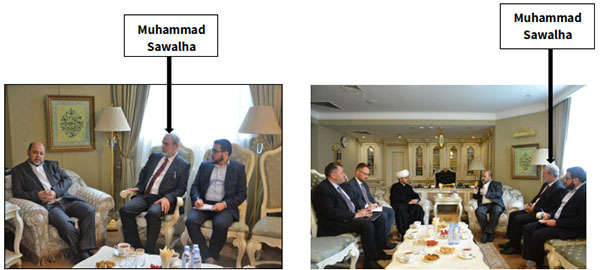
In January 2017, direct proofs indicated the activation of Russia’s work with Palestinian political factions with a view to consolidate them and back its hand in the Middle East.
On January 16, 2017, representatives of various Palestinian movements and parties met Russian Foreign Minister Sergey Lavrov in the Ministry of Foreign Affairs of Russia in Moscow.
Former Palestinian Liberation movement (Fatah), the Islamic Resistance Movement (HAMAS), the Palestinian Islamic Jihad (IJ), the Popular Front for the Liberation of Palestine (PFLP), The Democratic Front for the Liberation of Palestine (DFLP), the Palestinian National Initiative, and the Communist Party of Palestine attended the meeting.
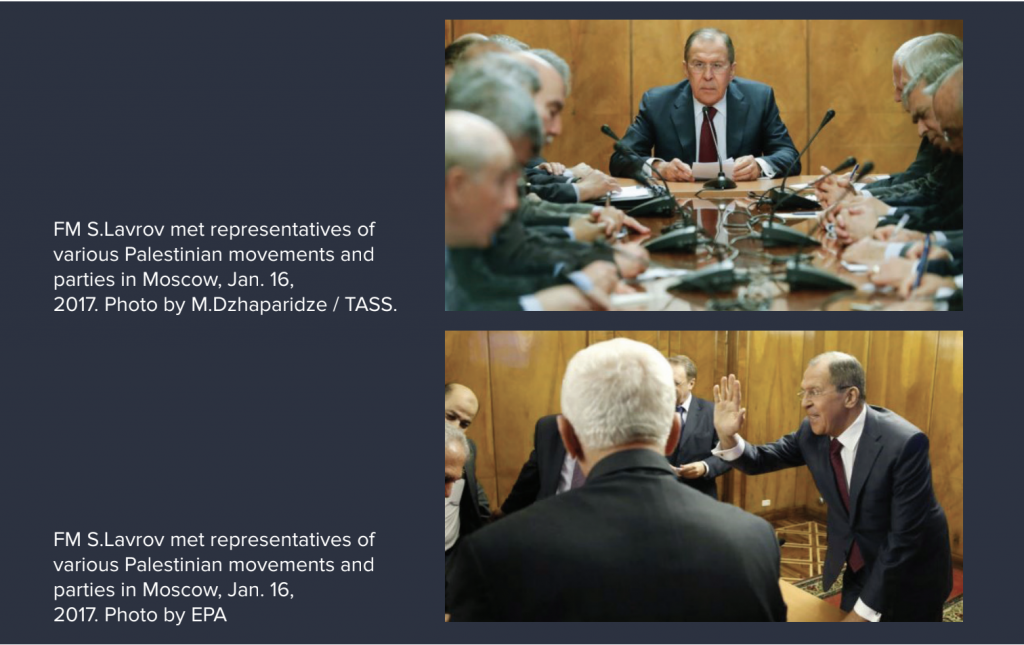
The ins and outs of the meeting and the way the Palestinian delegation and the head of the Russian foreign ministry were arranged at the table indicate that Russian side was dominant there and moderated the meeting of Palestinian organizations not as a negotiating party. A similar meeting was held in the Moscow area in 2011. The Kremlin has set for itself the task of uniting Palestinian political structures under the auspices of the Palestine Liberation Organization and the Arab Peace Initiative, with a view to create a government of national unity. Russia’s foreign policy focus on Palestine corresponds to the Soviet era Kremlin’s political course that extended it’s recognition to the state of Palestine in 1988. Moscow continues to engage with Palestine, hoping to gain a center of influence in the Middle East, tearing the axis of support for the West, thus sticking to the Soviet policies, focused on Syria and Yasser Arafat’s PLO.
Russia benefits from strengthening its hand in Syria, and rubbing elbows with Iran. Bogdanov had personal ambitions at the “Palestinian case.” He has been dealing with the Middle East since the 1970s, and he is the best at the Foreign Ministry to navigate the Syrian conflict and the Palestinian problem. Bogdanov, trading upon the Middle East issues, seeks to oust Foreign Minister Lavrov, and let down the head of the intelligence agency Naryshkin.
For that to happen, Bogdanov has a strong mind to put the screws on Israel to persuade it to negotiate with terrorists through the mediation of Russia.
As the Biden administration makes its initiative on the Iranian nuclear dossier, the Russians are encouraging the Hamas and other terrorist groups to subject Israel to an attack, not just to appropriate financial gains, but also persuade Jerusalem into serious political concessions. Bogdanov believes should the Israelis go for de-escalation, that will boost the Hamas rating, and terrorists will master enough votes during the upcoming Palestinian elections and seize power not only in Gaza, but also in the West Bank of the Jordan River. That would let Moscow use tactics of armed intimidation in other directions, disguised as diplomatic efforts and peacekeeping.
Russia has been studying the Palestinian feedback to the ultimate deal since 2019. The local media portray Russia as a friend of Palestine, the one who can protect the Palestinians. The Kremlin has spread rumors that Israel, backed by Washington, is going to annex all Palestinian territories.
The armed clashes between Hamas and Israel gave a demonstration of Russian-made weapons used by the Palestinians,and by Hezbollah, e.g., Cornet ATGM. From Russian warehouses in Syria, those weapons are passed via Iranian proxies in the region.

Read also: Russia is staking on the Hezbollah
Following the IRGC commander Qassem Soleimani’s death, the Russians turned out to set up communication channels with individual commanders, sidestepping Tehran, thus broadening the Kremlin’s scope.


